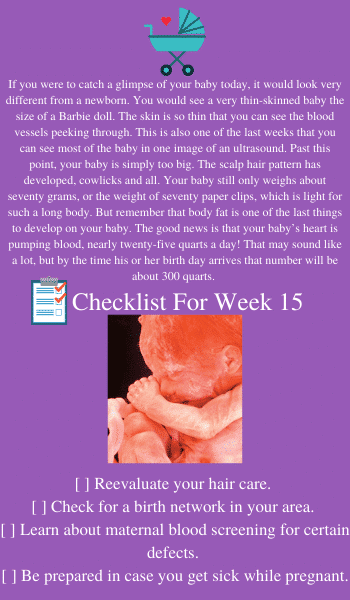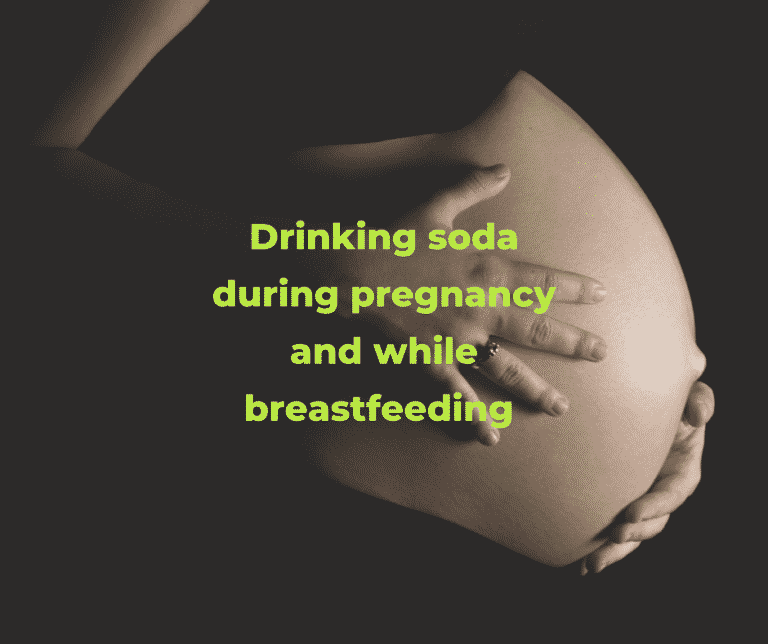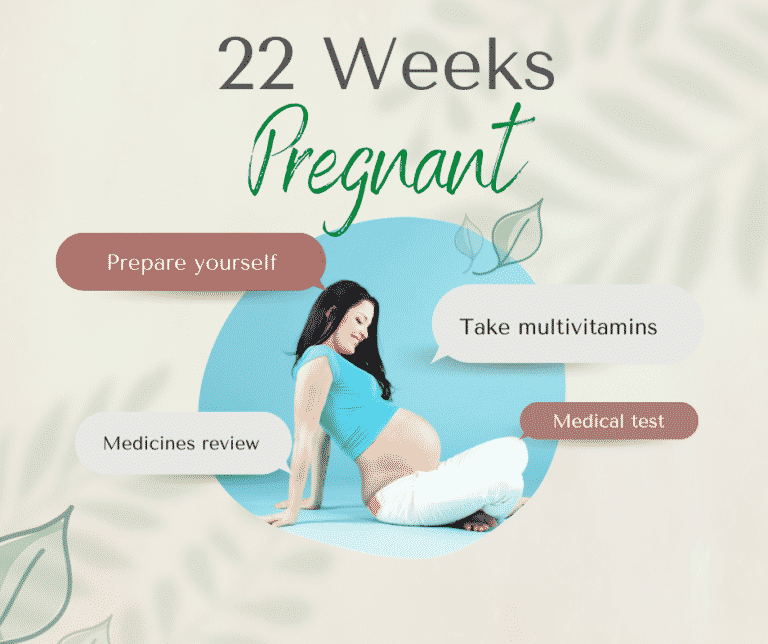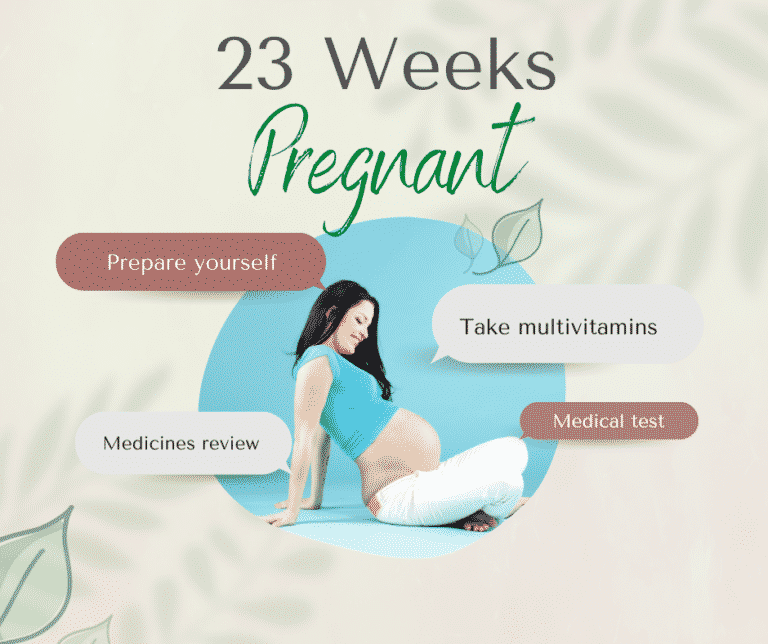15 weeks pregnant: Tips, Symptoms & Baby’s Development
Published on April 1, 2022 – Last Updated on April 22, 2022
You’re now 15 weeks pregnant, and your baby is growing daily. By now, your baby is about the size of a peach and has started to develop some features. You may be experiencing some new symptoms this week too.
This week’s blog post will outline some of the key developments your baby will experience in their fifteenth week of development. So continue reading to discover more about what’s going on in your baby’s world inside the womb. And as always, if you have any questions or concerns, please don’t hesitate to contact the doctor.
What to expect during the 15th week of pregnancy
At 15 weeks pregnant, many women experience some new symptoms. You have to expect some changes in your body like enlargement of breasts and more fatigue. You may also find that you have to go to the washroom more often as your baby starts to press on your bladder. Swollen gums are another common symptom during pregnancy. This is caused by an increase in blood flow to the gums.
This week, you should start to feel the baby move. Some women describe the feeling as a flutter or a kick. Others say that it feels like gas bubbles. The movement is usually harmless and does not indicate any problems.
If you have not yet had an ultrasound, you may be scheduled for one this week. An ultrasound can help determine the sex of the baby and look for any congenital disabilities.
15 Weeks into Pregnancy: Tips & Ultrasound

Make sure to check out our Pregnancy Week by Week & pregnancy week calculator posts where you can find great information for each stage of pregnancy based on weeks.
15 weeks into pregnancy, you may be starting to feel more like your old self again. The fatigue and morning sickness of early pregnancy should start to dissipate, and you may even have a bit more energy for activities like exercise.
15 weeks is also a good time to get an ultrasound, which can help you bond with your baby and give you a better idea of their size and development. While your 15-week-old fetus isn’t quite ready to survive outside the womb, they are continuing to grow and develop at an amazing rate. By the end of this week, their tiny heart will be fully formed and beating around 160 times per minute. Their lungs are also developed enough that they could theoretically begin breathing air, although they won’t be ready to do so for a few more weeks.
In the coming weeks, your baby’s brain will continue to grow and develop, and they will start to make reflex motions like sucking and swallowing. The bones in their skeleton will also start to harden, although they will remain quite soft and pliable.
15 Weeks Belly
For fifteen weeks, a woman’s belly grows as her fetus develops. The 15 weeks belly is often described as looking like a watermelon. The 15 weeks fetus is about the size of an apple. During this time, the fetus’s heart and brain continue to develop, and the bones and muscles begin to form. By the end of 15 weeks, the fetus is fully formed and begins to grow rapidly.
The 15 weeks belly is a significant milestone for pregnant women. It marks the halfway point of the pregnancy and is when many women begin to feel more comfortable with their bodies. It is also a time when the mother can feel the baby’s movements. Achieving 15 weeks of pregnancy is a particular time for both mother and child.
Changes in your body and symptoms you may experience
At 15 weeks pregnant, your body shows more and more changes. You will feel more tired, and you will also have to go to the washroom more often because of the baby who is pressing on your bladder. The moment your breasts are exposed to chilly weather, they’ll start growing in size. This is all normal, so don’t worry! If you are experiencing any other symptoms, be sure to speak with your healthcare provider.
In this Week, Your Body passes out through different symptoms and changes. These are as follows:
Fatigue:
At 15 weeks pregnant, You feel more tired than ever and need to take naps during the day.
Eating more frequently:
During pregnancy week 15, You may find yourself snacking more often or wanting smaller meals more frequently throughout the day.
Bladder pressure:
As your baby grows, they will start to press on your bladder, which will cause you to feel the need to use the washroom more often.
Enlarged breasts:
Your breasts will continue to grow and may be sore or tender to the touch. You may also notice that your areolas (the dark area around your nipples) have grown larger and darker.
Morning Sickness:
Morning sickness is also a symptom of pregnancy that usually goes away after the first trimester. But Very Often, You’ll get Morning sickness.
Pregnancy Weight Gain:
During pregnancy week 15, Most women gain about 2 to 4 pounds during the first trimester. Nearly half of this weight is the baby’s body, placenta, and amniotic fluid. So, don’t worry if you don’t feel like you’re gaining enough weight (It is also due to pregnancy hormones). Just make sure you’re eating healthy and staying active, and the weight will come.
These are some common changes that a woman’s body goes through during pregnancy (Whether first or second). Still, it is essential to remember that every woman experiences pregnancy differently, so not all of these symptoms will be felt by everyone. If you are experiencing any other worrisome symptoms, please consult with your doctor.
- Fetal development: Pregnancy Week 15
Baby’s development
At 15 weeks pregnant, your baby is now the size of an apple! They are continuing to grow and develop at a rapid pace. The amniotic sac is now protecting your baby from bacteria, and they are starting to produce urine. Their organs continue to grow, and their skeleton is beginning to form. Blood Vessels are also being created, and the baby’s heart is now beating regularly. Blood Volume has also increased, and their skin is becoming more opaque.
Your baby’s skin is thin and translucent but will start to thicken and become less transparent as they continue to grow. In addition, the lanugo, or fine hair covering their body, organs begin to produce meconium – their first stool. Your baby’s skeleton is also hardening, and they can make movements, although you won’t be able to feel them yet.
Baby’s Skin:
Her skin is still translucent and delicate, and you can see their blood vessels through it.
Baby’s Bones:
The bones in your baby’s body are starting to harden, and the cartilage that was forming their skeleton is now being replaced with bone.
Baby’s Ears:
Your baby’s ears are now in their final position and have started to grow hair around them.
Baby’s Eyes:
Your baby’s eyes are now fully developed, but the irises still don’t have any pigment.
Baby’s risk of developing specific congenital disabilities
As your baby grows and develops, they are at risk for developing particular congenital disabilities. These include abnormalities in the heart, spine, and brain. So you have to take care of yourself, and also, You can talk to your doctor about what screening tests are available; if you have any doubts, you to help detect these defects.
The baby weighs: approximately.
At 15 weeks pregnant, your baby weighs approximately 4 ounces (113 grams). They are now about the size of an apple!
Recommended prenatal care and tests
During the 15th week of pregnancy, your health care provider will likely recommend that you have a prenatal visit. You will probably have a physical exam and urine test at this visit.
Tips for the 15th-week
You should have to take care of Yourself, and you should be feeling more pregnancy symptoms by now. For example, you will experience enlargement of breasts and fatigue. Other physical changes are happening in the 15th week: you may find that you have to go to the washroom more frequently as your baby starts to press on your bladder, and your skin may become more sensitive and prone to breakouts.
So Take these steps for Healthy Pregnancy:
Drink Plenty Of Fluids:
You should drink at least eight glasses of water or other fluids every day. Pregnant women are especially susceptible to dehydration because they have an increased blood volume, and their kidneys work overtime to filter waste products from the baby’s blood.
Eat a nutritious diet:
Eating a balanced diet is essential for all pregnant women, but it’s vital in the second trimester. The baby is growing faster now and needs more nutrients to support its growth. So make sure you’re eating plenty of fruits, vegetables, whole grains, and lean protein.
Avoid risky behaviors:
Pregnant women should avoid smoking, drinking alcohol, and using drugs. These substances can harm the baby in many ways, including increasing the risk of miscarriage, congenital disabilities, and developmental problems.
Get enough sleep:
Most pregnant women need at least eight hours of sleep per night. During the second trimester, your body is working harder than ever, and you may find that you’re more tired than usual. Take advantage of naps and get to bed early whenever you can.
If you are feeling sick, there are medicines that you can take. In addition, some natural remedies may help, such as ginger or acupressure.
Pregnancy is a fantastic time in a woman’s life, but it’s also essential to take care of yourself both physically and emotionally. Speak to your doctor if you have any questions or concerns, and enjoy this particular time!
Tips for Partners:
If your wife is pregnant, then be prepared for some changes. You may find that she is more tired and emotional than usual. She will probably have larger breasts and may need to go to the washroom more often. Be supportive and understanding as she goes through these changes. It would be best if you had to:
Take him to Parks:
Going to parks can be great fun for the whole family, and it’s a perfect place to take your pregnant partner. The fresh air and exercise will do her some good, and she’ll enjoy spending time with you and the kids.
Help Out Around the House:
Pregnant women are often tired, so don’t be afraid to pitch in and help around the house. Whether it’s doing the dishes, taking out the trash, or vacuuming the floors, your help will be appreciated.
Attend Doctor’s Appointments:
It’s essential to be involved in your partner’s pregnancy, and one way to do that is to attend her doctor’s appointments with her. This way, you can learn more about what’s going on with the pregnancy and ask any questions you may have.
Be There for Her:
Pregnant women often need a lot of emotional support. Just being there for her when she needs to talk will mean a lot. You can also lend a hand by rubbing her back or feet or just spending time with her.
FAQs
Where is my baby at 15 weeks in my stomach?
Your baby is near the stomach now. Your baby has been growing up by a factor of two and is roughly the size of a lemon now. All major organs have formed, and your baby’s nervous system is starting to function.
What are some common symptoms at 15 weeks pregnant?
Common symptoms include fatigue, enlarged breasts, frequent urination, and skin changes.
Should I lay on my stomach at 15 weeks pregnant?
It is generally not recommended to lay on your stomach during pregnancy as it can pressure the baby. However, some women find that sleeping on their stomachs is more comfortable in the early stages of pregnancy.
If you have any concerns, speak to your doctor.
How to take care of myself at 15 weeks pregnant?
There are a few things you can do to take care of yourself at 15 weeks pregnant:
Eat a healthy diet of vegetables, including plenty of fruits and whole grains; avoid risky behaviors such as smoking, drinking alcohol, and using drugs; get enough; see and speak to your doctor if you have any concerns or questions.
Is week 15 is the second trimester?
Yes, 15 weeks is considered the start of the second trimester. This is a necessary time for both you and your baby, so be sure to take care of yourself!
Other Pregnancy Weeks:
- 1 Week Pregnant
- 2 Weeks Pregnant
- 3 Weeks Pregnant
- 4 Weeks Pregnant
- 5 Weeks Pregnant
- 6 Weeks Pregnant
- 7 Weeks Pregnant
- 8 Weeks Pregnant
- 9 Weeks Pregnant
- 10 Weeks Pregnant
- 11 Weeks Pregnant
- 12 Weeks Pregnant
- 13 Weeks Pregnant
- 14 Weeks Pregnant
- 16 Weeks Pregnant
- 17 Weeks Pregnant
- 18 Weeks Pregnant
- 19 Weeks Pregnant
- 20 Weeks Pregnant
- 21 Weeks Pregnant
- 22 Weeks Pregnant
- 23 Weeks Pregnant
- 24 Weeks Pregnant
- 25 Weeks Pregnant
- 26 Weeks Pregnant
- 27 Weeks Pregnant
- 28 Weeks Pregnant
- 29 Weeks Pregnant
- 30 Weeks Pregnant
- 31 Weeks Pregnant
- 32 Weeks Pregnant
- 33 Weeks Pregnant
- 34 Weeks Pregnant
- 35 Weeks Pregnant
- 36 Weeks Pregnant
- 37 Weeks Pregnant
- 38 Weeks Pregnant
- 39 Weeks Pregnant
- 40 Weeks Pregnant
- Birth Plan
- Baby Due Date Calculator
- EDD Calculation
- how many weeks pregnant I am






